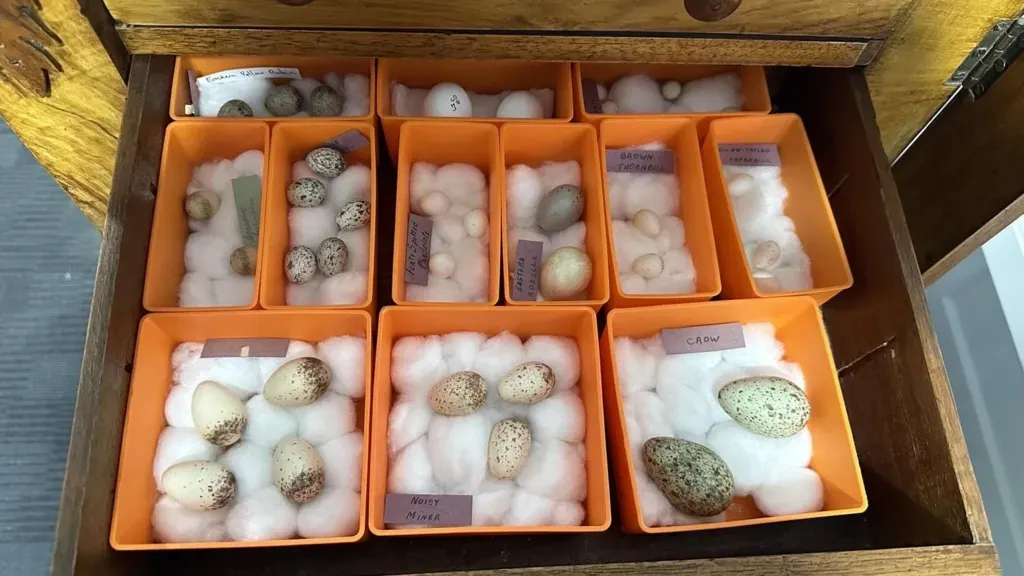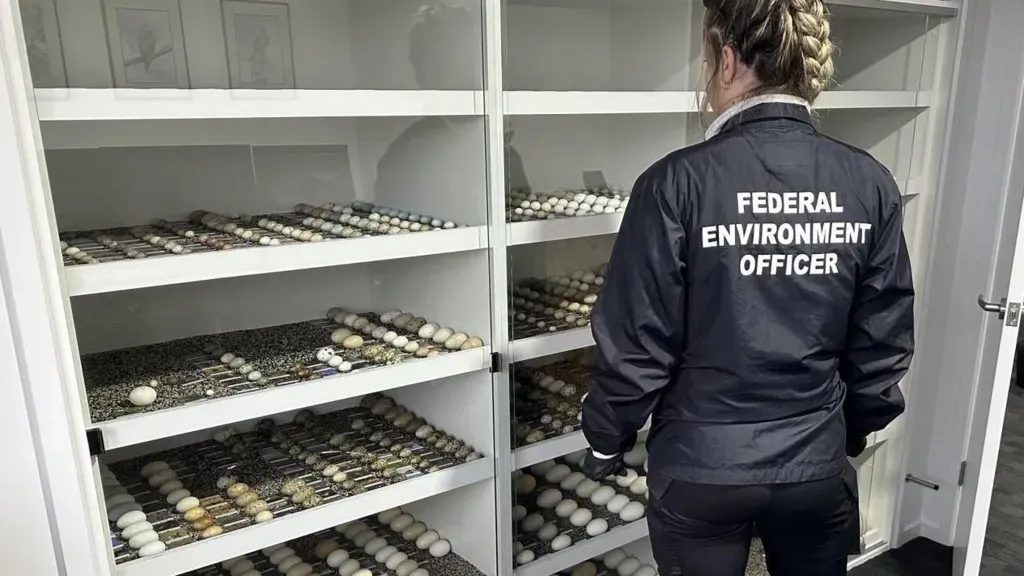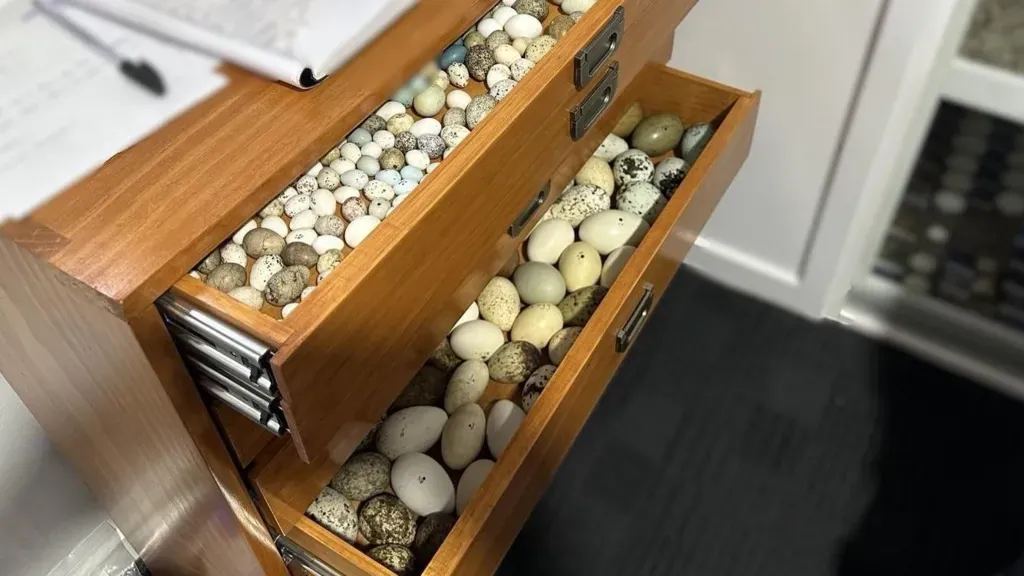In a significant crackdown on illegal wildlife trafficking, Australian authorities have uncovered a staggering cache of 3,404 rare bird eggs, revealing the underbelly of the illicit global wildlife trade. This revelation, which comes after a coordinated European investigation, sheds light on the alarming practices threatening endangered species worldwide. The following detailed account explores the intricacies of this case, its implications, and the broader context of wildlife crime.
Table of Contents
ToggleDiscovery of the Seized Bird Eggs
The Operation and Seizure
On July 9, 2024, law enforcement agents in Granton, Tasmania, made a critical discovery. A meticulous investigation led by European authorities, focused on the illegal bird trade, culminated in the seizure of an enormous collection of bird eggs. This operation, part of a larger global effort to combat wildlife crime, unearthed 3,404 eggs at a single property, marking one of the largest seizures in recent memory.

The seized eggs, valued between AUD 400,000 and AUD 500,000 (approximately GBP 207,000 to GBP 259,000), were all found to be hollowed out, having been “blown” to remove the contents. This process rendered the eggs largely ornamental, stripping them of their natural value and potential for reproduction.
The Suspect and Investigation
A 62-year-old man has been identified as a suspect in this case. While investigations are ongoing, no formal arrests have been made yet. This individual is being scrutinized under allegations of involvement in the collection, harvesting, and international trade of these bird eggs. According to the federal Department of Climate Change, Energy, the Environment and Water (DCCEEW), the suspect is accused of violating the Environment Protection and Biodiversity Act 1999.

The Broader Context of Wildlife Crime
Environmental and Wildlife Crime: A Growing Threat
The illegal wildlife trade has emerged as one of the most lucrative and rapidly growing sectors of organized crime globally. This sector not only poses a severe threat to biodiversity but also drives numerous species to the brink of extinction. The Australian case is part of a broader pattern of environmental crime that spans continents.
In Europe, 2023 saw the launch of a major investigation into the illegal trade of bird eggs, which led to the seizure of over 56,000 eggs. This indicates a troubling trend in the commodification of wildlife, driven by both domestic and international demand.
CITES and the Protection of Endangered Species
The Convention on International Trade in Endangered Species of Wild Fauna and Flora (CITES) plays a crucial role in regulating the international trade of endangered species and their derivatives. The seized eggs are believed to include specimens from species listed under CITES, including those at high risk of extinction.
CITES, an international agreement involving over 180 countries, aims to ensure that international trade does not threaten the survival of wild animals and plants. The significance of this agreement cannot be overstated, given that it covers more than 40,000 species.
Species at Risk: The Eggs’ Potential Origins
Endangered Bird Species
Preliminary analysis suggests that the seized eggs may include those from highly endangered species such as the forty-spotted pardalote, a bird endemic to Bruny Island in Tasmania, the swift parrot, and the shy albatross. These species are known for their precarious conservation status, making the illegal trade of their eggs particularly concerning.
Tasmanian ecologist Dr. Sally Bryant has emphasized the scale and seriousness of egg collecting, noting that such activities are “morally, ethically, and legally corrupt.” She highlights that operations of this magnitude are conducted by skilled individuals over many years, reflecting a deeply entrenched criminal network.
Legal Ramifications and Penalties
The Australian legal system imposes severe penalties for crimes involving endangered species and their derivatives. The possession of CITES-listed specimens, including bird eggs, can result in up to five years of imprisonment and fines of up to AUD 330,000. The illegal export of Australian native specimens, including eggs, carries even harsher penalties, including a maximum of ten years’ imprisonment.
Government Response and Future Actions
Official Statements and Reactions
Tanya Plibersek, Australia’s Minister for the Environment and Water, has voiced strong condemnation of the illegal wildlife trade. She underscored the critical need to address this growing threat, stating, “Illegal trafficking and wildlife crime is fast becoming a threat for many of our species that are already at risk of extinction.” Her remarks reflect a broader governmental commitment to combatting wildlife crime and preserving Australia’s unique biodiversity.
Future Investigations and Measures
Following the seizure, an inquiry will be conducted to assess the full extent of the illegal activities and the individuals involved. The Australian government has pledged to rigorously enforce wildlife protection laws and ensure that such crimes are met with appropriate legal consequences.
Conclusion: A Call for Action
The seizure of thousands of rare bird eggs in Tasmania serves as a stark reminder of the ongoing battle against illegal wildlife trade. This case not only highlights the urgent need for enhanced enforcement and international cooperation but also calls for increased public awareness and advocacy to protect endangered species. As the investigation unfolds, the world watches closely, hoping for decisive actions that will curb the illegal trade and safeguard the future of our planet’s most vulnerable wildlife.


